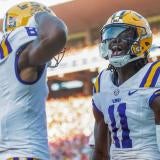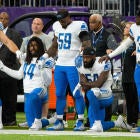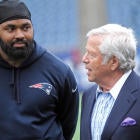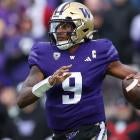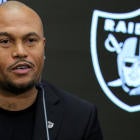Little did Colin Kaepernick or anyone else expect that when he started protesting racial injustice and police brutality against minorities during the 2016 preseason by refusing to stand for the national anthem while he was still a 49ers quarterback, his demonstrations would be the impetus for the NFL being embroiled in controversy this season. Other players continuing the protests as Kaepernick remains unsigned since parting ways with the 49ers in early March has been extremely polarizing.
A significant portion of the country views kneeling during the anthem as unpatriotic and disrespectful toward the flag and military even though the players are adamant that isn't the intention of their actions. President Donald Trump briefly intensified the protests with disparaging remarks he made about NFL players at a September rally in Alabama where he suggested that NFL owners should fire those who kneel. He subsequently took the NFL to task for refusing to require standing.
Commissioner Roger Goodell and the owners believe players should stand, with Cowboys owner Jerry Jones being the most outspoken. Instead of forcing the players to stand, Goodell and a group of owners met with several players last month about supporting their social activism in hopes that it would lead to a voluntary end of the anthem protests.
TV ratings of NFL games are slightly down from last year but consistent with the overall decline in TV viewership. Some people have vowed to never watch the NFL again because of the player kneeling. NFL executive vice-president of communications Joe Lockhart recently conceded that several sponsors are unhappy with the declining ratings. Executives from Papa John's, the official pizza company of the NFL, blamed lagging sales on the handling of the player protests before backtracking from that position.
The NFL hasn't been able to put the anthem controversy behind them although the number of players protesting has steadily decreased. It wouldn't be a surprise if some owners start creating contractual incentive for players to stand in the offseason without making it compulsory by imitating the Bengals at the turn of the century. Jones would seem to be the owner most likely to go this route given his strong views about kneeling during the anthem.
Wide receiver Carl Pickens' heavy public criticism late in the 1999 season of the Bengals' decision to retain head coach Bruce Coslet for the 2000 season prompted ownership to start insisting on a clause in player contracts allowing for all or part of a player's signing bonus to be forfeited for publicly criticizing team officials, coaches or teammates. This loyalty clause immediately led to highly contentious contract negotiations with several Bengals before the players reluctantly conceded the issue.
The NFLPA filed a grievance challenging the validity of the loyalty clause. An arbitrator upheld the clause in 2001 as a way for a team to discourage conduct considered objectionable because it was a product of an arm's length negotiation and distinct from the discipline provisions in the NFL Collective Bargaining Agreement (CBA).
Several other teams soon followed suit by insisting on similar loyalty language in their own player contracts. Carson Palmer, the 2003 first overall pick, couldn't overcome the precedent the Bengals had set. His rookie contract with the Bengals included the loyalty clause putting his $10 million signing bonus at risk with negative comments about the team.
NFL teams won't be able to recoup a signing bonus with refusing to stand for the anthem or any conduct considered disrespectful to the flag because the current CBA specifically outlines circumstances in which a signing bonus can be forfeited. These actions do not trigger the forfeiture of money.
The CBA does provide for the negotiation of contract provisions where salary guarantees void. Practically every NFL player contract signed since the CBA took effect in 2011 with salary guarantees contains voiding language for an exhaustive list of defaults by the player. This includes the contracts of the NFL highest paid players, such as Lions quarterback Matthew Stafford, and top draft picks, like Cowboys running back Ezekiel Elliott.
The default language in Elliott's contract that controls the voiding of his guarantee reads as follows:
"In the event that, at any time during the NFL Player Contract Year(s), any of the following occurs for any reason whatsoever, Player shall be deemed in default of this Guarantee ("Default"): (i) without Club's express prior written consent, Player fails or refuses to report to Club or fails or refuses to practice or play for Club or Player fails or refuses to report for Club-ordered medical care or treatment for any reason, including, but not limited to, due to Player's injury as a result of (a) a breach of Paragraph 3 of the NFL Player Contract or (b) participating in a hazardous activity that affects Player's ability to perform the services under this NFL Player Contract, or an activity that involves a significant risk of personal injury and is non-football in nature, including, but not limited to, skydiving, hang gliding, bungee jumping, rock or mountain climbing, scuba diving, surfing, skiing, snowboarding, auto racing, motorcycling, use of firearm(s), fireworks, or explosives; or (ii) Player leaves Club for any reason whatsoever and without Club's express prior written consent, including without limitation, voluntary retirement, incarceration or detained by any law enforcement personnel for more than seventy-two hours; or (iii) Player is suspended by the NFL and/or Club for any reason whatsoever; or (iv) Player is fined or suspended by the NFL and/or Club for conduct detrimental to Club and/or NFL; or (v) Player is fined or suspended for violating the NFL Policy and Program for Substances of Abuse, the NFL Policy on Anabolic Steroids and Related Substances, or the NFL Personal Conduct Policy; or (vi) Player engages in conduct reasonably judged by Club to adversely reflect on the Club; or (vii) Player takes any action or makes any public comment to the media, including, but not limited to, any newspaper, magazine, television station, radio station, social media or internet, that Club determines, in its sole discretion, breaches an obligation of loyalty to Club and/or undermines the public's respect for, or is critical of, Player's teammates, Club's ownership, coaches, management, operations, medical or football personnel, or policies; or (viii) Player commits any Forfeitable Breach (as defined in Article 4, Section 9(a) of the CBA); or (ix) Player materially breaches any provision of the NFL Player Contract. If Player is in Default, then this Guarantee shall immediately be deemed NULL AND VOID from the beginning and in its entirety regardless of whether or not the Guarantee had otherwise been earned according to its terms at the time of Player's Default. In the case of such Default, Player shall still be entitled to earn the Paragraph 5 Salary as stated in the NFL Player Contract on a weekly, non-guaranteed basis for as long as Player is on Club's roster and Player meets all customary criteria for earning such Paragraph 5 Salary, subject to any applicable withholdings, deductions, or fines."
Elliott's contract captures the essence of these provisions. The loyalty clause the Bengals started has been incorporated under section (vii). The exact language voiding guarantees varies from team to team. It may not be quite as comprehensive as Elliott's but PED, substance abuse, conduct detrimental and personal conduct suspensions are usually among the numerous defaults.
Elliott's entire rookie contract was fully guaranteed prior to him being handed the suspension for violating the league's personal conduct policy he is currently serving. The suspension has wiped out not only the guarantee of his 2017 base salary but with his 2018 base salary of slightly more than $2.7 million and his 2019 base salary, which is approximately $3.85 million. It's now easier for the Cowboys to release him if his play starts to decline at any point during his rookie contract because the salary cap consequences aren't as great without the guarantees in place.
Several teams have taken advantage of guarantees voiding. Trent Richardson, the third overall pick in the 2012 NFL draft, was given a two-game suspension by the Colts for missing a walkthrough the day before the 2014 season's AFC Championship Game without alerting the team beforehand of his absence, which was due to a serious family emergency. Richardson's 2015 base salary of almost $3.2 million had been fully guaranteed prior to the suspension. His salary remained the same but was no longer guaranteed because of the default language in his contract once he was suspended. This allowed the Colts to release Richardson without minimal salary cap consequences.
The NFLPA filed a grievance on Richardson's behalf challenging the voiding of the contract guarantee shortly after he was released. Richardson's grievance was eventually settled with him receiving just over $550,000 of his 2015 salary.
Cornerback Chris Culliver's one-game suspension in 2015 under the NFL's personal conduct policy eliminated his $8 million 2016 salary guarantee with the Redskins. The $8 million of cap space the Redskins gained from cutting Culliver in 2016 came in handy. It's the same amount of cap room used in the first year of the contract Josh Norman signed with Washington shortly before the 2016 draft making him the NFL's highest paid cornerback.
Players, especially rookies, would likely have the same success resisting anthem clauses as Bengals players did with the loyalty clause if teams start pursuing these provisions. Highly sought after free agents would have the best chance of avoiding this contract language by making its omission an important factor in their decision to sign with a team. There would likely be some players that wouldn't object to the including the language in their contracts because they believe standing for the anthem is appropriate and don't agree with the protest.
A successful NFLPA challenge to the inclusion of an anthem provision to the extensive guarantee voiding language would be an uphill battle. The same rationale in the decision of the Bengals loyalty clause grievance would likely be applicable.
A contractual provision would not completely resolve the issue like a rule requiring players to stand. The same potential for a player backlash wouldn't exist and the contract language could have a chilling effect for possible protesters. Owners could tout it publicly as a measure taken to curb protests that might satisfy some unhappy with kneeling. Protesters with existing contracts wouldn't be affected, nor would players whose contracts don't contain salary guarantees.










